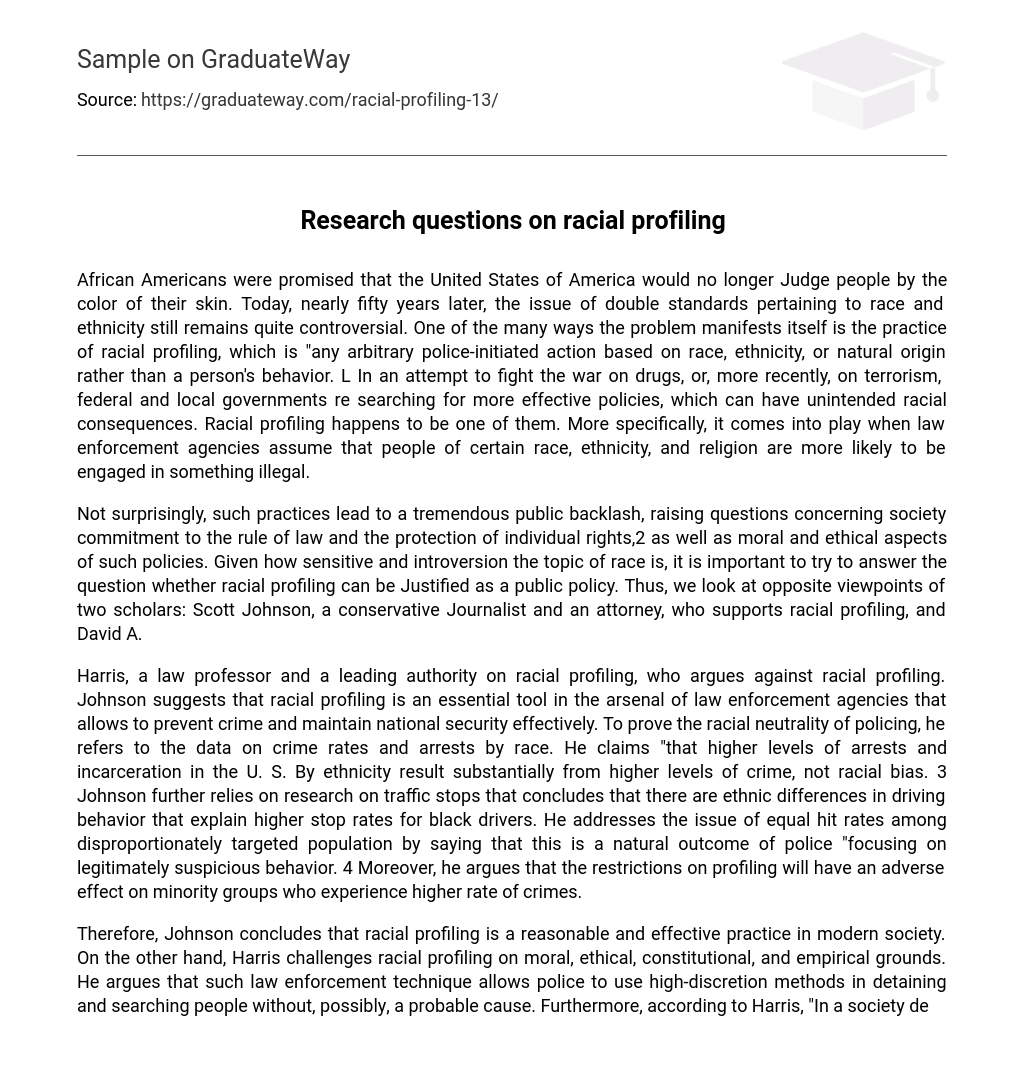Despite the promise that the United States would cease discriminating against people based on their skin color, the issue of racial and ethnic double standards remains a contentious topic even after nearly fifty years. Racial profiling is an example of this problem, which involves law enforcement actions influenced by race, ethnicity, or national origin rather than behavior. In order to combat drug trafficking and terrorism, both federal and local governments are seeking more effective policies that can unintentionally lead to racial consequences. One such consequence is racial profiling, where law enforcement agencies assume that individuals from certain races, ethnicities, or religions are more likely to participate in illegal activities.
Anticipated is the negative response from the public to these practices, as it raises concerns about society’s dedication to upholding the rule of law, safeguarding individual rights, and considering the moral and ethical implications associated with these policies. Given the sensitive nature of race, it becomes crucial to determine whether racial profiling can be justified as a public policy. To delve deeper into this matter, we analyze opposing viewpoints from two scholars: Scott Johnson, a conservative journalist and attorney who supports racial profiling, and David A.
Harris, a law professor and racial profiling expert, opposes racial profiling. On the other hand, Johnson argues that racial profiling is necessary for law enforcement agencies to effectively prevent crime and maintain national security. To support his argument, Johnson presents data on crime rates and arrests by race to show that policing is unbiased. He claims that the disproportionate levels of arrests and incarceration among certain ethnicities in the U.S. are primarily due to higher crime rates rather than racial bias. Additionally, Johnson mentions research on traffic stops that backs the idea that disparities in driving behavior among different ethnic groups contribute to higher stop rates for black drivers. He addresses concerns about equal hit rates among targeted populations by stating that it’s expected when police focus on genuinely suspicious behavior. Moreover, he argues that limitations on profiling will negatively affect minority groups who experience high crime rates.
In regards to racial profiling, Johnson asserts that it is a valid and efficient method in today’s society. Conversely, Harris raises objections to racial profiling based on moral, ethical, constitutional, and empirical grounds. He contends that this law enforcement technique permits officers to exercise extensive discretion in apprehending and investigating individuals without necessarily having a reasonable cause. Additionally, Harris argues that relying on race and ethnicity to enforce laws contradicts the Constitution and the established political culture of America. He further maintains that racial profiling undermines the bond between the police and citizens, alienating minority groups and perpetuating damaging stereotypes. Harris also supports his stance with statistical data, challenging the efficacy of racial profiling by highlighting that the rate of discovering drugs and weapons in police searches of African Americans is either equal to or lower than that for white individuals.
In essence, the author suggests that racial profiling could only be considered justifiable if there were higher rates of success among the targeted minorities. However, since the rates are either equal to or lower than others, relying on race becomes illogical. Harris aims to invalidate the belief that racial profiling is a valid and efficient practice, stating that it is “founded on distorted crime perceptions and a limited approach in addressing it.”6 He advocates for a shift in societal perspective on crime.
There is a significant divide in America when it comes to racial profiling, with different viewpoints being expressed. Scholars, political figures, and activists are using different types of evidence to demonstrate the existence of racial bias in policing. Despite their differing explanations, it is crucial to prioritize human rights and individual liberties over law enforcement interests. Some may argue that data justifies racial profiling; however, protecting fundamental rights must be given more importance.
The principle of equality should be applied to all individuals without exception. According to Ronald Attack, a respected scholar in multicultural studies, it is crucial to acknowledge that Americans have diverse origins and deserve respect and dignity. However, when law enforcement practices discretionary actions that involve racial profiling, it may violate the belief in equal protection under civil rights legislation and the U.S. Constitution. Relying solely on race as a significant factor for anticipating potential misconduct is completely unacceptable in a society that values liberty and justice.
Recent studies have shown that racial profiling is highly controversial due to its perceived inefficiency. Research findings indicate that the rates of contraband found among minorities tend to be lower in riffling-based drug searches. Additionally, evidence suggests that blacks and Latinos who are stopped as a result of racial profiling are no more likely, and sometimes even less likely, to possess drugs or other illegal items compared to white individuals. Consequently, enforcing the law through racial profiling not only violates equal treatment principles but also diminishes law enforcement effectiveness.
Furthermore, targeting racial minorities disproportionately and justifying these actions undermines both police legitimacy and community relations. This can lead to a loss of respect for police officers within affected communities and potentially contribute to increased criminal activity as these communities may no longer perceive the police as a legitimate moral authority but rather as a threat.





